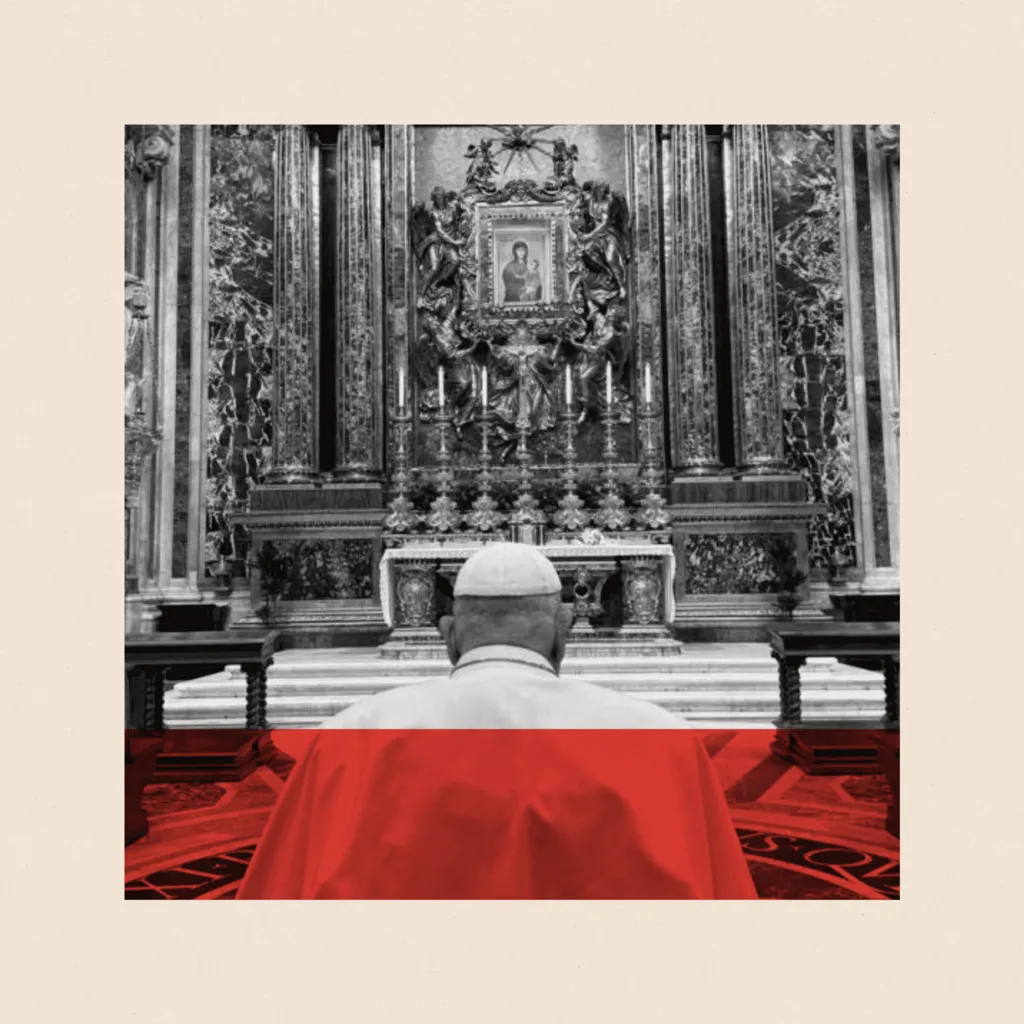
 BBC
BBCOver 12 profoundly consequential years for the Catholic Church, Pope Francis steered it into uncharted territory and did so in ways that will resonate long into the future.
The pontiff worked to soften the face of the Catholic Church for many, loosened the Vatican's grip on power and intervened in some of the major social questions of our time.
Within Catholicism, he certainly had his critics; some traditionalists in particular were often enraged by actions they felt were a radical departure from Church teaching.
Despite him being a vocal pacifist and critic of actions by major nations that he perceived as harmful, there were also those who felt he should have been more progressive.
But from the moment he was elected in 2013, Pope Francis came with an informality and a smile that put the people he met at their ease. It was symbolic of a principle that guided his belief that the Church should reach people in their daily lives, wherever in the world they happened to be.
"At the beginning of my papacy I had the feeling that it would be brief: no more than three or four years, I thought," Pope Francis said in his autobiography Hope, released in January 2025, a book that gives us insight into the Pope's own reflections on his legacy.
One of his first acts as pope was to give up the papal apartment on the third floor of the Apostolic Palace, instead choosing to live in the same guesthouse in which he had stayed as a cardinal.
Some saw this as a sign he was giving up the ostentatious trappings of papacy, and of the humility he would certainly become known for - he had, after all, taken the name of a saint who championed the cause of the poor.
But the main reason for surrendering the papal apartment, as he later explained it, pointed to another of his characteristics: that he loved being around people.
To him, the apartment felt detached and a difficult place in which to welcome guests. At the guesthouse he was surrounded by clergy and rarely alone for long.
On foreign trips to more than 60 countries, in his audiences at the Vatican and during countless events, it was very clear that being close to people, and particularly the young, was his lifeblood.
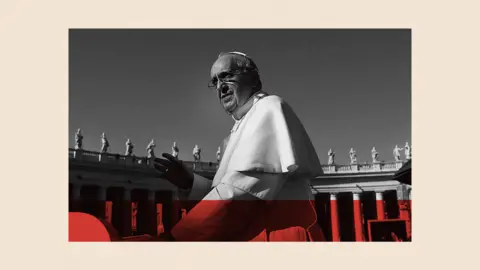 Getty Images
Getty ImagesWithin Catholicism, he signalled a radical change in tone on some social issues.
"Everyone in the Church is invited, including people who are divorced, including people who are homosexual, including people who are transgender," he wrote in his autobiography.
Given that the Church did not recognise divorce in its canon law and that previous popes had talked of homosexuality as a disorder not "a human fact," as Pope Francis did, this was a departure that again concerned traditionalists.
But the Pope appeared to want the Church to explore and understand people's every day struggles in a fresh light. He acknowledged his own journey in seeing things differently to the way he had done in the past.
Progressives welcomed the Pope's compassion for what he called "imperfect Catholics," but there was also a recognition more broadly that words of acceptance from a pontiff could have an effect on those outside the Church too.
"The first time that a group of transgender people came to the Vatican, they left in tears, moved because I had taken their hands, had kissed them... as if I had done something exceptional for them! But they are daughters of God," he wrote in Hope.
Pope Francis roundly condemned countries that consider homosexuality a crime, and he talked of divorce sometimes being "morally necessary", citing cases of domestic abuse.
However, there are those who suggest the Pope could have gone further to encourage change in Church teaching.
Homosexual "acts" remain a sin in Catholicism, marriage can still only be between a man and a woman, divorce is still not officially recognised and the Pope himself remained very firmly against gender reassignment and surrogacy.
Throughout his papacy, and long before that, Pope Francis also always remained firm in his own belief that women should not be priests.
He did however describe the Church as "female" and encouraged parishes around the world to find more leadership roles for women in ways that were consistent with the Catholic teaching that does not currently allow women to be ordained.
In 2021 Sister Raffaella Petrini was appointed secretary general of the papal state and under Pope Francis the Vatican did start an ongoing process of exploring whether women could take up the role of deacon, assisting in worship services.
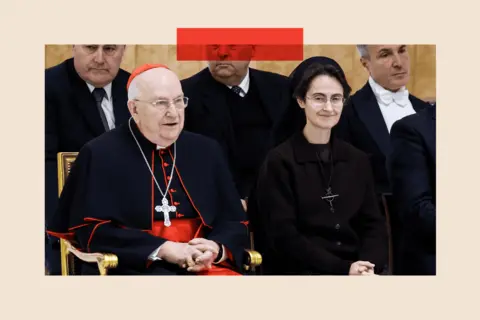 EPA
EPANevertheless, some reformists were left disappointed that more progress was not made regarding equality for women, in a faith where the majority of churchgoers are women.
During the latter part of his papacy, the Pope launched an ambitious three-year consultation process aimed at gauging the opinion of as many of the world's more-than-a-billion Catholics as possible.
There were tens of thousands of listening sessions across the globe, meant to tease out the issues that Catholics most cared about. It transpired that roles for women and ways in which the Church could become more inclusive to LGBT+ Catholics were high on the list.
While the process itself did not lead to decisive action on either front, it did speak volumes about Pope Francis' desire that his pontificate was rooted not in Rome and in clerics but in the lives of believers around the world.
Throughout his papacy, there was a particular focus on reaching out to those on the economic and political margins, his words and actions encouraging his priests to be closer to the disadvantaged.
The issue of dignity for migrants was hugely important to him throughout his papacy, but so too was building bridges with other Christian denominations, other religions and those of no faith.
On occasions, to some Catholic traditionalists, the Pope's outreach appeared inappropriate for someone of his position, like his visit to a centre for asylum seekers outside Rome in spring 2016 when he washed and kissed the feet of refugees that included Muslims, Hindus and Coptic Christians.
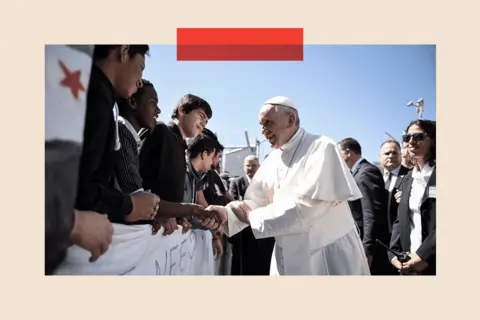 Greek Prime Minister's Office
Greek Prime Minister's OfficeAs well as becoming a passionate voice for migrants - once going to lay a wreath on the waters where many had died on their perilous journeys - he also linked the impact of climate change to poverty.
In speeches, including one to US Congress, and in one of his most important pieces of work, the decree Laudato Si, Pope Francis talked of environmental damage amounting to rich countries inflicting harm on poor ones.
Vehemently anti-war, the Pope frequently talked of conflict itself equating to failure.
He called the war in Gaza "terrorism" and from early on he implored that there be a ceasefire.
He met the families of the Israelis abducted by Hamas on 7 October 2023, but also spoke passionately about the plight of Palestinian civilians in Gaza, particularly children, and made daily calls to the Holy Family Church in Gaza City.
But sometimes a longing to build bridges was seen by some observers as getting in the way of Pope Francis taking a firm stance against wrongdoing.
In the eyes of many, he failed to unequivocally call out Russian aggression in Ukraine or tackle China's surveillance and persecution of its Catholics.
From the very start of his papacy, he also faced huge tasks confronting misconduct much closer to home.
The scourge of corruption had long dogged the upper echelons of the Catholic Church. Early on, Pope Francis closed thousands of unauthorised Vatican bank accounts, and in the latter half of his time he introduced new rules on financial transparency.
It was in the way he dealt with the horrors of child sexual abuse by those associated with the Catholic Church that made it clear he knew it was something he would be judged by.
"From the very start of my papacy, I felt I was being called to take responsibility for all the evil committed by certain priests," he wrote in Hope.
As an illustration of the scale of the problem that remains, in 2020 the Catholic Church released lists of living members of clergy in the US alone found to have been accused of sexual abuses - these included clergy linked to child pornography and rape. There were around 2,000.
"With shame and repentance, the Church must seek pardon for the terrible damage that those clergy have caused with their sexual abuse of children, a crime that causes deep wounds of pain," he recently wrote.
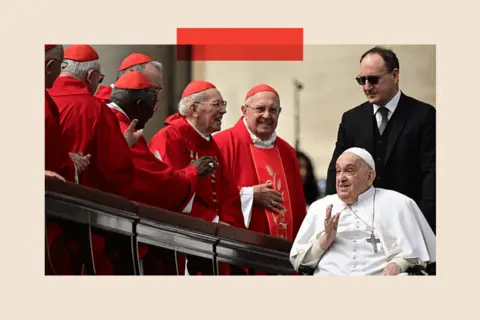 AFP
AFPAmong other initiatives, Pope Francis introduced rules that meant members of the Church had a responsibility to report on abuse if they had knowledge of it, otherwise they risked being removed from their positions.
Though he made errors of judgement, on occasions publicly supporting clergy even though they were alleged to have failed to deal with abuse, Pope Francis was quick to apologise for his own mistakes and for the deep failings of the Church.
Both at the Vatican and abroad he would frequently meet with Church abuse victims. Saying "sorry" for abuse was the prime focus of some foreign trips.
A huge part of Pope Francis' legacy is the way in which he changed the face of the upper echelons of the Catholic Church through his selection of new cardinals.
In fact, about 80% of the cardinals that will select the next pope were appointed by Pope Francis. What is striking about those selections is their diversity, with many coming from South America, Africa and Asia.
It was part of Pope Francis' mission to consolidate a change in the centre of gravity of Catholicism away from Europe, where it was in decline, towards the places it was thriving, and to reflect that in Church leadership.
The posthumous outpouring of tributes to him from across the globe is perhaps one sign that shift is working.
Top picture credit: Reuters
BBC InDepth is the home on the website and app for the best analysis, with fresh perspectives that challenge assumptions and deep reporting on the biggest issues of the day. And we showcase thought-provoking content from across BBC Sounds and iPlayer too. You can send us your feedback on the InDepth section by clicking on the button below.